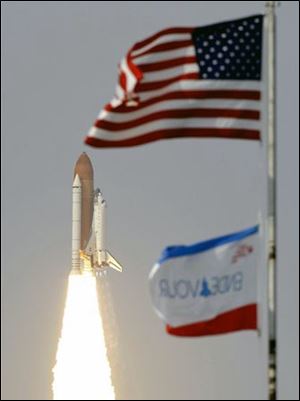
Shuttle Endeavour blasts off after a month of delays
7/15/2009
Shuttle Endeavour and seven astronauts lift off Wednesday for a 16-day mission to the international space station.
CAPE CANAVERAL, Florida After more than a month's delay, space shuttle Endeavour and seven astronauts thundered into orbit Wednesday on a flight to the international space station, hauling up a veranda for Japan's enormous lab and looking to set a crowd record.
Success came on launch try No. 6, on the eve of the 40th anniversary of the liftoff of man's first moon landing.
Endeavour blasted off a little after 6 p.m. (2200 GMT) from its seaside pad the same one used to launch Apollo 11 on July 16, 1969 a welcome sight for shuttle workers who had to overcome hydrogen gas leaks last month and, since the weekend, thunderstorms.
The skies finally cleared, allowing commander Mark Polansky and his crew to embark on their 16-day adventure. One more holdup and they would have tied a record for the most shuttle launch delays.
"The weather is finally cooperating, so it is now time to fly," launch director Pete Nickolenko called out to the crew. "Persistence pays off."
Replied Polansky: "Endeavour's patiently waited for this. We're ready to go, and we're going to take all of you with us on a great mission."
Endeavour soared through thin clouds and was visible, gleaming in the sunlight, for three minutes. The exhaust plume and its shadow linked together to resemble a high arc in the sky.
The astronauts will catch up Friday with the space station, which was soaring more than 220 miles (355 kilometers) above the Pacific at launch time. When they do, it will be the first time 13 people are together in space. Ten is the previous record. The doubling of the space station crew a few months ago, to six, makes the new record possible.
The shuttle will remain docked at the space station for nearly two weeks. During that time, the shuttle astronauts will help install the third and final piece of the Japanese space station lab, a porch for outdoor experiments. The first two parts went up on shuttle flights last year.
Japan's $1 billion laboratory is the largest and fanciest of the three up there. It even has its own robot arm which will be used for the first time, during the coming days, to move research payloads.
Shuttle managers say robot arm operations will be especially intricate on this flight, involving all three of the available mechanical devices.
Five spacewalks are planned to help attach the new porch to the Japanese lab, give the space station some new batteries and perform other maintenance.
Endeavour also is carrying up hundreds of pounds of food for the station crew and a fresh station resident, an American who will take the place of the lone Japanese on board.
All of the major space station partners will be represented once Endeavour arrives. The combined crews will have seven Americans, two Canadians, two Russians, one Japanese and one Belgian. All but one are men.
NASA was anxious to get Endeavour flying, given time is running out on the shuttle program.
Only eight shuttle flights remain, including this one, before NASA retires the fleet. The White House wants those missions completed by the end of next year if at all possible. Each one is dedicated to finishing the space station now 81 percent complete and hauling up supplies and big spare parts that are too big to fly on any other rocketship. Some of those large parts, including a pump and antenna, are flying up on Endeavour.
The lengthy delay means Endeavour will be in orbit on the 40th anniversary of man's first steps on the moon, on Monday.
The Endeavour crew, meanwhile, claimed its own record with Wednesday's launch. Rookie astronaut Christopher Cassidy became the 500th person in space.
And Polansky, the skipper, is set to become only the second person to use Twitter in space.
One technical issue during the final stage of the countdown involved a shuttle fuel cell. Engineers worried that the fuel cell one of three identical electrical powerplants might not be able to operate at low power during the flight, which could cut short the mission. Mission managers cleared the issue shortly before liftoff.